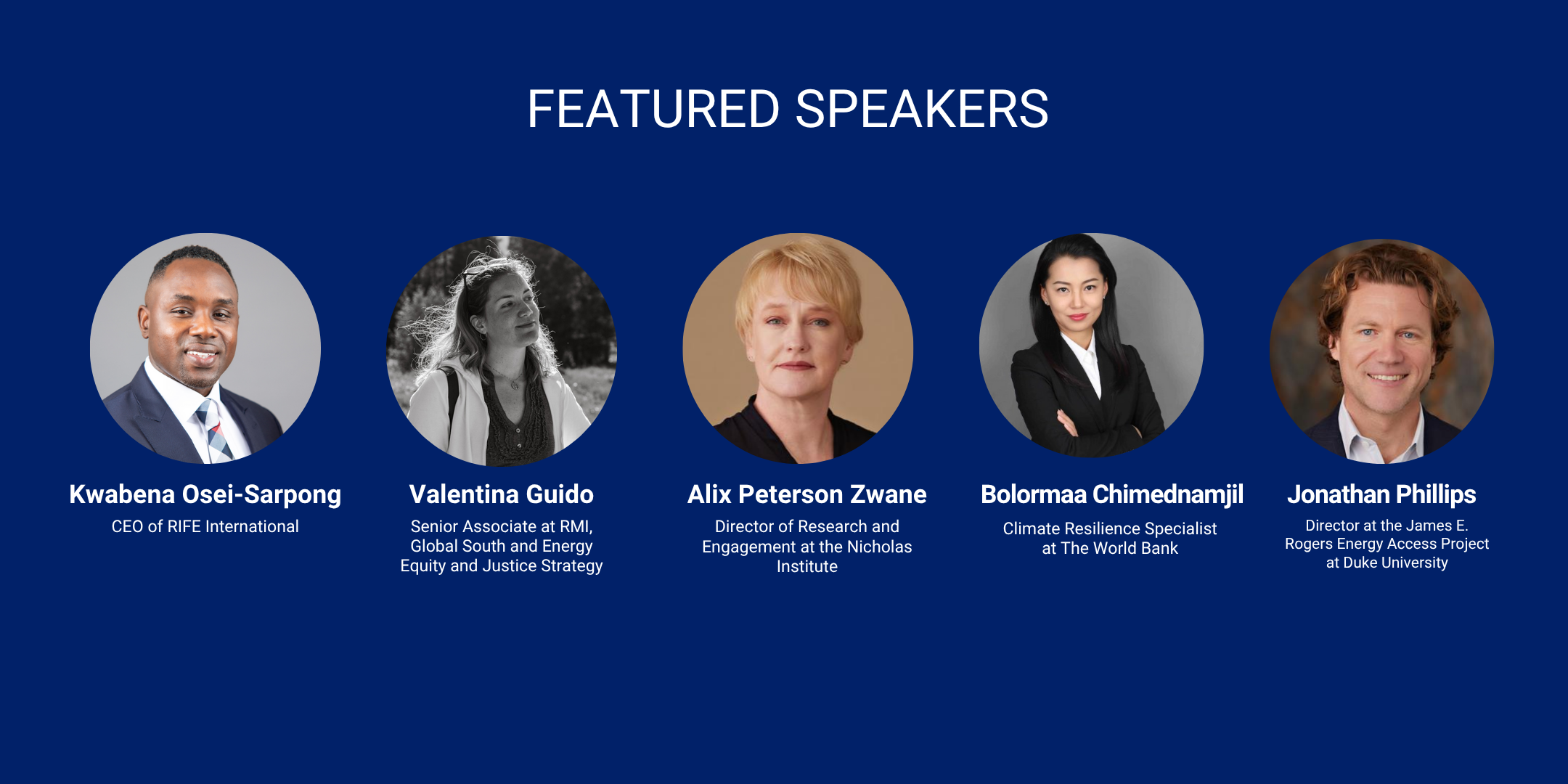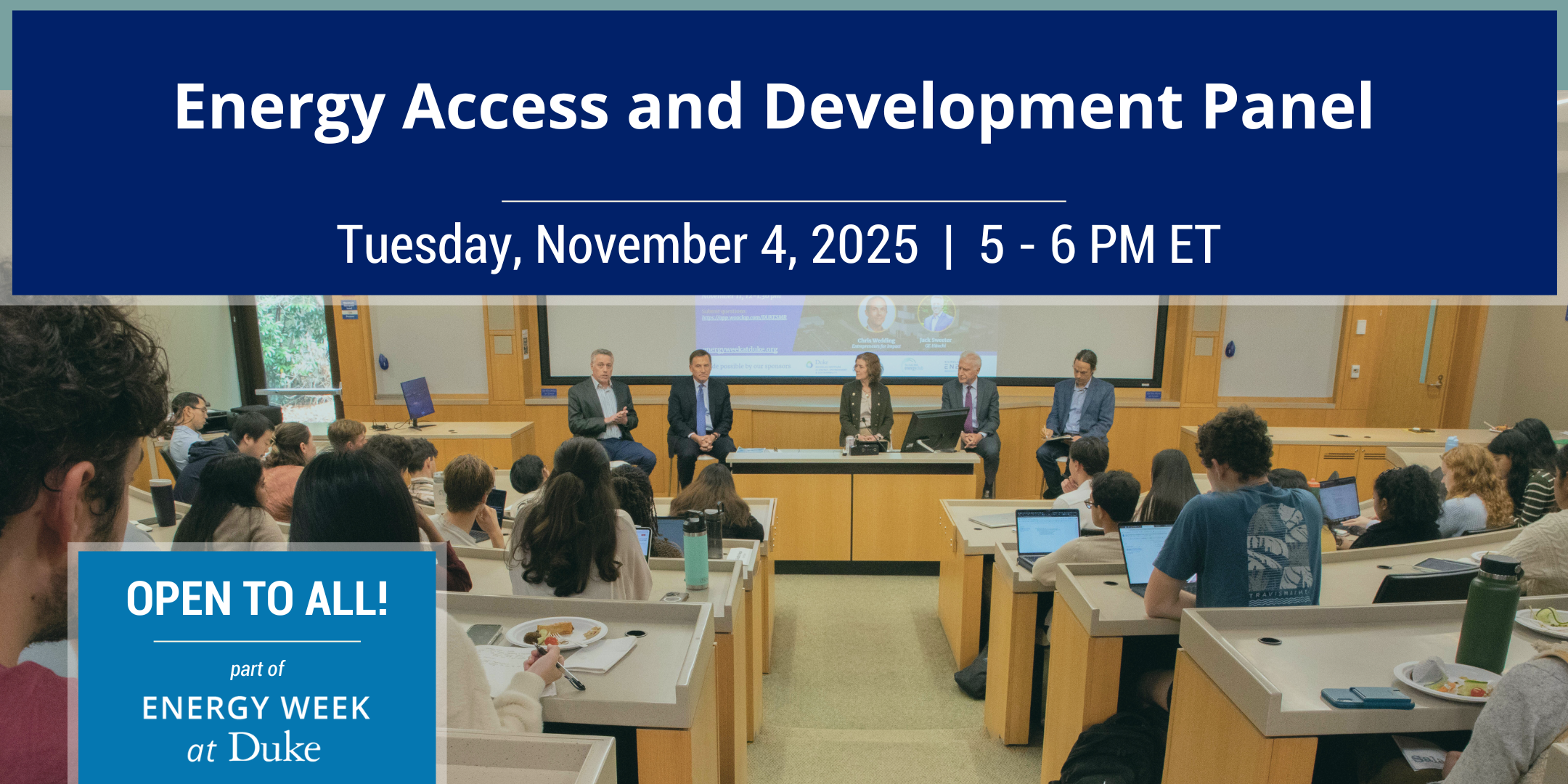Energy Access and Development Panel
Tuesday, November 4, 5 – 6 p.m.
Join us for a panel discussion focusing on the Mission 300, energy access, and clean energy projects in low- and middle-income countries.
Location: Fuqua Sauer Classroom, The Fuqua School of Business (100 Fuqua Drive, Durham, NC 27708)
Food will be provided.
This panel will explore the trends and innovations in energy access and development in low-income communities and countries. We will bring together professionals working in energy and development to unpack the current trends in the industry, challenges to address, and opportunities for growth. This is an exciting opportunity to hear from leaders in the Energy Access and Development space working towards an equitable future by addressing the energy needs of developing communities. The panel will be followed by a live Q&A with the panelists so bring your questions!

Featured Speakers:
Kwabena Osei-Sarpong is the founder and CEO of RIFE International, an award-winning energy-efficiency and renewable energy firm headquartered in Maryland, with offices in Ghana and South Africa. A global thought leader in sustainability and clean energy, he is recognized for his dedication to advancing climate solutions through innovation, leadership, and green technology. Under his guidance, RIFE has delivered projects for high-profile clients across the U.S. and Africa. Beyond his entrepreneurial work, Osei-Sarpong has advised the White House Council on Environmental Quality and serves on the U.S. Department of Commerce’s Renewable Energy and Energy Efficiency Advisory Committee (REEEAC). He is also an active member of several influential boards, including the Maryland Clean Energy Council, Georgetown University Advisory Board, and Power-Gen International Advisory Board.
Honored globally for his impact, Osei-Sarpong has received numerous awards such as Africa’s Most Respected CEO (2023), Maryland’s Most Admired CEO (2022), and Energy Innovator of the Year. A graduate of Georgetown University with executive education from Harvard Business School, he continues to shape the clean energy dialogue through public speaking, mentorship, and philanthropy. As a Master Coach at the Skinner Leadership Institute and mentor to emerging entrepreneurs, he remains deeply committed to empowering the next generation of leaders and driving equitable, sustainable development across the globe.
Valentina Guido is a senior associate with the Global South and Strategy programs at RMI, currently supporting the ideation and implementation of a variety of projects focusing on equity, environmental justice, gender and community engagement. Some of Valentina’s work involve convening the Africa Minigrids Program’s Community of Practice, developing RMI’s Energy Transition Academy’s gender offerings, and engaging with community-based organizations in California. Prior to these roles, Valentina led research on supply chain traceability issues and helped establish RMI’s Carbon Markets initiative, where she developed a framework to assess social and environmental impacts of carbon credit generation.
Before joining RMI in 2021, Valentina worked as a sustainability analyst for the Reporting Matters project of the World Business Council for Sustainable Development (WBCSD). Prior to that, she was a research and communications assistant at the Energy Politics Group of ETH Zurich and the Sustainable Stock Exchanges (SSE) Initiative within the United Nations Conference on Trade and Development (UNCTAD). Outside of work, Valentina is a passionate Toastmaster. In her home club, she serves as VP of Mentorship. In New York City’s District 46, she serves as an area director overseeing and supporting 5 clubs.
Alix Peterson Zwane is director of research and engagement strategy at the Nicholas Institute for Energy, Environment & Sustainability. She is also a Newhouse Visiting Professor of the Practice at Duke University’s Sanford School of Public Policy.
Prior to joining the Nicholas Institute, Alix was the first chief executive officer of the Global Innovation Fund, a hybrid investment vehicle that accelerates evidence-based innovation through early-stage debt and equity investing, as well as grantmaking. GIF is backed by leading bilateral aid agencies, corporates, and foundations and contributes to filling the pioneer gap between development assistance and development finance.
Alix has over 20 years of experience advancing the agenda of evidence-based aid and international development as an investor, a social entrepreneur, and an innovator. She was the first employee and executive director at Evidence Action, a nonprofit that develops service delivery models to scale evidence-based programs. Alix has also advocated for evidence-based philanthropy at the Bill & Melinda Gates Foundation and Google.org, and served on the faculty of the department of agricultural and resource economics at University of California, Berkeley.
Alix holds a Ph.D. in public policy from Harvard University and is a World Economic Forum Young Global Leader. She has served appointments as a non-resident fellow at the Center for Global Development and at the Jackson School of Global Affairs at Yale University.
Bolormaa Chimednamjil is a sustainability and infrastructure professional with The World Bank Group. Her work centers on upstream, policy, and project preparation support for renewable energy and infrastructure investments in developing markets. She focuses on supporting public and private sector clients in integrating climate resilience, enhancing investment readiness, and strengthening institutional capacity to accelerate sustainable energy transitions and expand access to clean energy.
At the World Bank, Bolormaa contributes to analytical and advisory programs that guide governments and partners in aligning energy sector planning and public-private partnership (PPP) frameworks with sustainability and clean energy goals. Within the World Bank Group, she has worked across several areas spanning climate policy, infrastructure, and investment operations. As part of the Climate Change Group, she led monitoring and evaluation for the Climate Support Facility Trust Fund and served as editor of the World Bank’s Global Reporting Initiative (GRI) Index for corporate climate disclosure and sustainability reporting.
Earlier, with IFC’s Global Infrastructure team, she supported portfolio monitoring, mobilization of concessional finance for renewable energy trust fund programs, and renewable energy PPP transactions. At the start of her career, she was part of the Global Green Growth Institute, where she worked on renewable energy policy and investment planning initiatives and engaged extensively with climate finance mechanisms such as the Green Climate Fund.
An alumna of the World Energy Council’s Future Energy Leaders (FEL-100) program, Bolormaa is passionate about advancing sustainable infrastructure and low-carbon development across developing economies.
Moderator: Jonathan Phillips is the Director of the James E. Rogers Energy Access Project at Duke University, with an appointment at the Nicholas Institute for Energy, Environment & Sustainability. His work focuses on policy, regulatory, and economic issues related to rural electrification, grid de-carbonization, off-grid energy systems, and energy for productivity.
Phillips was the senior advisor to the president and CEO of the Overseas Private Investment Corporation during the Obama Administration, helping scale-up the agency’s climate finance capabilities and lead the implementation of strategic initiatives, including the agency’s $2.1 billion Power Africa portfolio.
Before that, Phillips led private sector engagement and programming with Power Africa at USAID, helping ramp-up the $300 million presidential initiative into one of the largest public-private development partnerships in the world.
From 2007-2014, he held a variety of roles in the U.S. Congress, most recently serving as the senior policy advisor to Senator Ed Markey of Massachusetts. He supported many notable legislative efforts, including serving as one of the lead authors of the Waxman-Markey cap-and-trade bill that passed the House in 2009. He also served on the House Select Committee on Energy Independence and Global Warming as well as the House Natural Resources Committee.
Phillips was a business and economic development volunteer with the Peace Corps in Mongolia. He received a bachelor’s degree from the Milwaukee School of Engineering and a master’s degree in public policy from the Harvard Kennedy School.

